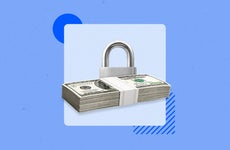Are CDs worth it right now? Here’s what experts say

The Bankrate promise
At Bankrate we strive to help you make smarter financial decisions. While we adhere to strict , this post may contain references to products from our partners. Here's an explanation for .
Certificates of deposit, or CDs, offer you a chance to keep your cash safe from loss of principal — and potentially earn a higher yield than what you’d get with a savings account.
With a CD, you commit to keeping your money locked up for a set amount of time, and the bank or credit union often rewards you by paying a higher yield than that of a standard savings account. The flipside, however, is that you could end up paying penalties and fees if you withdraw your money early.
Before you incorporate CDs into your investment strategy, here are a few things to keep in mind.
CD rates have risen significantly but will level out in 2023
Just a year ago, the national average one-year CD rate was only around 0.3 percent APY. Today that average has risen to 1.72 percent on one-year CDs — a result of many rate hikes by the Federal Reserve since last year to combat inflation.
However, the yields on CDs are already starting to level off as the Fed slows down on raising interest rates, according to Greg McBride, CFA, Bankrate chief financial analyst. After 10 consecutive rate hikes, the Fed chose to forgo a rate hike in June.
“The upside on CD yields is pretty limited from here,” McBride says. “Yields on maturities longer than one year have already plateaued and are unlikely to move higher, while any further improvement in yields on CD maturities of one year and less will be dependent on whether, and by how much, the Fed hikes rates again.”
What a potential recession means for CD investing
The odds that the U.S. economy will enter a recession in 2023 are high — experts say on average there’s a 64 percent chance that will be the case, according to Bankrate’s First-Quarter Economic Indicator poll.
A recession could negatively impact consumers’ employment prospects, bargaining power, ability to borrow money and variable-rate investments. That means, in short, that many consumers will face a tightening of their budget.
While rates that fluctuate with the market, such as on stock and bond investments, may be rocky during a recession, CD rates are generally fixed. If you invest money in a CD, it will continue to grow at the same rate for the duration of the term. That could be a plus for those who can comfortably afford to stash away money for a given period of time.
Still, it’s important to consider your financial priorities in the case of a recession. If you have high-interest, variable-rate debt, you may want to pay that down as much as possible and avoid incurring even higher interest charges as rates fluctuate. It’s also advisable to prioritize your emergency savings fund before investing in a CD. Establishing a solid emergency fund in a more liquid savings account can help you make it through financial hardships and temporarily make up for a loss of income.
Pros of investing in CDs
- Potentially higher yield than savings accounts
- Principal remains protected
- Guaranteed rate of return
- Possibility of adding long-term stability to a portfolio with a CD laddering strategy
Cons of investing in CDs
- Money isn’t as liquid as in a savings account
- May face penalties for withdrawing money early
- Yields don’t always beat inflation
- Returns are often low compared to stocks and ETFs
When investing in a CD is worth it
One of the biggest reasons to use CDs is for security. You don’t have to worry about losing your principal because the money is usually held in an insured account.
For those looking to keep a portion of their portfolio in a principal-protected investment for the long term, using a laddering strategy — in which your CDs mature at different points — can be one way to add stability.
CDs can also be useful to save for the short term — six to 18 months. Locking up some of your money in a CD can prevent you from dipping into your funds for other purposes and ensure the money goes to the proper goal, says Morgan Blackman, wealth coach, investor and founder of Holistic Bucks Coaching based in Ontario, Canada.
When investing in a CD is not worth it
Though CDs are stable and safe, the reality is that you might not get the best return for your money. On top of that, Blackman points out that even with a high yield, you’re not likely to beat inflation with a CD investment.
So, while CDs can provide some guaranteed returns over time and some level of security, they’re not likely to provide you the returns needed to build wealth for retirement over time. Instead, it might make more sense to build wealth with other assets and only use CDs for a portion of your portfolio.
Additionally, CDs might not be worth it if you need more access to your savings, since there’s a penalty for withdrawing the money early. For example, if you’re building an emergency fund, avoid keeping that fund in a CD. It’s better to store your emergency fund in a savings account, where you can withdraw the money whenever it’s needed.
Alternatives to CDs in 2023
Rather than investing in CDs, Blackman suggests looking into government bonds, such as Treasury Inflation-Protected Securities (TIPS), which provide some protection against inflation while being fairly safe. The effective interest rate paid on TIPS moves up or down, along with inflation.
“Consider low-risk mutual funds as well,” Blackman says. “They aren’t as risky as stocks, but they can still yield better returns than CDs.”
Fred Jacobs, senior manager, media relations and sponsorships at Ent Credit Union, Colorado’s largest credit union, suggests looking into money market accounts and mutual funds, as well as bonds and dividend-paying stocks.
Finally, another option that might make sense is a fixed annuity. If you already have a large chunk of capital and are looking for something stable, a fixed annuity might provide better returns than a CD. These contracts, typically made with an insurance company, guarantee a certain amount of income for a set period.
“The most important factors to consider are your risk tolerance and how potential returns compare among CDs, stocks, bonds, mutual funds and other products that would provide you with a rate of return for your money,” Jacobs says.
Bottom line
As part of a portfolio that includes cash, CDs can provide stability and security. However, CDs are unlikely to provide you with the returns you need to build wealth for the future or live off the interest — unless you already have a large amount of money and ladder your CDs to avoid penalties.
Additionally, CDs lack the liquidity you’d need for something like an emergency fund. To recession-proof your finances, it’s important to establish an emergency fund in a savings account before focusing on other investments.
“I recommend speaking with a financial advisor to compare your options,” Jacobs says. “Discuss your risk tolerance and timelines, and determine the best products for your individual situation.”
It’s easy to find a qualified financial advisor to guide you through life’s most important financial decisions.
Try Bankrate’s free AdvisorMatch service to quickly get connected to a CFP® professional who can help you achieve your financial goals.
— Bankrate’s René Bennett contributed to a previous version of this story.
Related Articles



